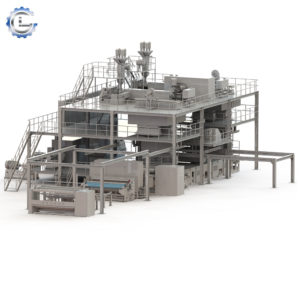Fabric-making machines employ various techniques and processes to ensure uniformity and consistency in fabric production:
Precision Machinery: Modern fabric-making machines are equipped with advanced technology that ensures precise and consistent operations, including weaving, knitting, dyeing, and finishing.
Automated Controls: Automation minimizes human error by controlling parameters such as tension, speed, yarn feeding, and machine settings consistently across the production line.
Quality Control Sensors: Fabric-making machinery integrates sensors that continuously monitor fabric parameters, detecting variations in tension, thickness, or color to maintain uniformity.
Standardized Processes: Standard operating procedures are established and followed rigorously throughout the production line to ensure consistency in each stage of fabric manufacturing.
Calibration and Setup: Regular calibration and setup checks are performed on machinery to maintain accuracy and ensure uniformity in fabric construction, texture, and appearance.
Material Selection and Handling: Careful selection of high-quality raw materials and consistent handling throughout the production process contributes to uniformity in the final fabric.
Process Optimization: Machinery settings and processes are optimized to create consistent fabric characteristics, such as yarn twist, weave patterns, or knitting tensions.
Batch Control and Tracking: Batch tracking systems allow manufacturers to trace materials and monitor production batches, ensuring uniformity from batch to batch.
Inline Inspections and Corrections: Inline inspections and automatic correction systems identify and rectify inconsistencies during production to prevent defects from continuing through the process.
Sampling and Testing: Regular sampling and testing of fabrics at different production stages ensure adherence to quality standards and specifications.
Quality Assurance Protocols: Strict quality assurance protocols are implemented, including visual inspections and manual checks, to verify uniformity and consistency.
Feedback Loops: Machinery may incorporate feedback loops that adjust settings based on real-time data to maintain consistent fabric properties.
By employing these measures and technologies, fabric-making machines strive to ensure that fabrics produced are uniform, consistent in quality, appearance, and performance, meeting industry standards and customer expectations.
How does fabric-making machinery accommodate the production of specialized fabrics for industries like healthcare or automotive?Fabric-making machinery adapts to produce specialized fabrics for industries like healthcare or automotive by incorporating specific processes, materials, and quality standards tailored to meet the unique requirements of these sectors:
Advanced Material Selection: Machinery accommodates specialized materials suitable for healthcare or automotive applications, such as antimicrobial textiles for healthcare or flame-retardant fabrics for automotive interiors.
Functional Finishes and Treatments: Fabric-making machines integrate treatments and finishes tailored for specific industry needs, such as moisture-wicking or stain-resistant coatings for healthcare textiles or UV-resistant treatments for automotive fabrics.
Precision Weaving or Knitting Techniques: Machines utilize weaving or knitting techniques that produce fabrics with specific characteristics required in healthcare or automotive settings, such as high-tensile strength or breathability.
Compliance with Industry Standards: Fabric-making machinery ensures compliance with industry-specific regulations and standards, such as medical-grade fabric certifications or automotive safety standards for interior textiles.
Customized Design and Patterns: Machinery can create specialized designs or patterns tailored for healthcare garments or automotive upholstery, accommodating industry-specific aesthetics or functional requirements.
Integration of Functional Elements: Machines incorporate functional elements into fabrics, such as conductive fibers for smart textiles used in healthcare monitoring or sound-absorbing materials for automotive interiors.
Quality Control and Testing: Fabric-making machinery implements stringent quality control measures,
fabric making machines including testing fabrics for durability, colorfastness, safety, and performance as per industry requirements.
Customization and Adaptability: Machinery allows for customization to meet specific needs, such as producing flame-resistant fabrics for automotive upholstery or antibacterial textiles for healthcare uniforms.
Efficiency and Speed: Machinery balances efficiency and speed without compromising quality to meet the high demand often seen in healthcare or automotive industries.
Collaboration and Innovation: Collaboration between fabric manufacturers and industry experts drives innovation, leading to the development of new fabric technologies and applications tailored to healthcare or automotive needs.
By incorporating these adaptations and considerations, fabric-making machinery ensures the production of specialized fabrics that meet the stringent requirements and performance standards of industries like healthcare and automotive, catering to their specific functional, safety, and regulatory needs.

